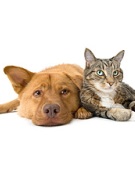There has been much hype around the vuvuzela and hearing damage during the Soccer World Cup, but what about the effect the noise has on our furry friends who have far more sensitive hearing than us? The buzz from a vuvuzela can affect more than your dog or cat's ears, it will probably excite or scare it too.
Dr Angus Campbell, Health24’s new CyberVet and a vet at CitiVet in Tamboerskloof, Cape Town, has some advice on how to prepare your pets for the noise and how to calm them down during the noise.
“As with thunderstorms, fireworks and gunshots, the vuvuzela may contribute to the development of noise phobia in our domestic animals during the World Cup,” he said.
He advises pet owners to keep an eye out for any of the following behaviours in their pets which would indicate a phobia towards noise:
- Shaking, trembling
- Drooling
- Vocalisation (barking/meowing)
- Dilated pupils
- Expressed anal glands
- Hiding or trying to escape (digging, jumping through windows, running away)
- Not eating or off food
- Seeking the owner more than usual
- Excessive/ surprise urinating and/or defecating
Campbell advises that pet owners take the following precautions to protect their pets:
- Ensure that your pet has a current ID: identification tag/microchip so that the local authorities can notify/return the pet.
- Keep your pet inside, close the curtains and turn on the TV/radio to provide a distraction.
- Provide a safe place: fearful or stressed animals often seek out areas where they feel safe. Ensure that this area is made comfortable with available water/food.
- Leash/carrier: if you have to go outside ensure that you pet is on a leash or in a carrier at all times.
- Walk first: if possible ensure that your animal has urinated/defecated before the fear stimulus starts (i.e. before a match when people are likely to be blowing vuvuzela’s).
- Project a calm attitude: if the owner is worried/nervous then this may add to the pet’s fear. Owners must always have an in-charge, calm and assertive attitude.
- Maintain good health/nutrition: health problems can augment the stress levels of the pet e.g. Hip problems could make the animal more irritable and prone to other behavioural changes. Diets too high in protein have also been linked to some behavioural problems. A veterinarian must be consulted in advance about changes in diet.
- Desensitisation: an animal’s response is decreased while they are exposed to elevated levels of fear producing stimulus. Consult a veterinarian/behaviourist before embarking on this approach.
- Counter-conditioning: teach the pet to display an acceptable behaviour rather than an unacceptable one as a response to a certain stimulus. Consult a veterinarian/behaviourist before embarking on this approach.
However, should this not work, Campbell advises using medication to keep the pet calm during noisy events or if they become distressed when a vuvuzela is blown.
“There is no guarantee that fear can be totally resolved, in many cases, however, the fear can be managed effectively. Commonly used prescription only medicines( POM) include Diazepam, Clomipremine, acepromazine melate, amitriptyline and fluoxetine. These POM’s are only available through from your local veterinary surgeon following a clinical examination of your pet,” he said.
He also advises speaking to your vet about Dog Appeasing Pheromones (DAP) or Feliway (the equivalent for cats), which he said can be a significant help and are available through your local veterinary practice and at pet shops.
Source: Dr Angus Campbell,aka CyberVet. Post a question to CyberVet here.
(Amy Henderson, Health24, June 2010)




 Publications
Publications
 Partners
Partners














